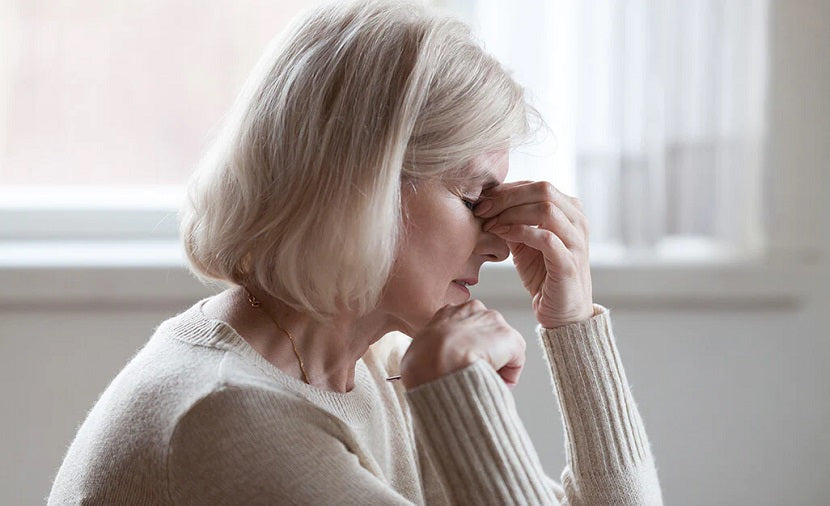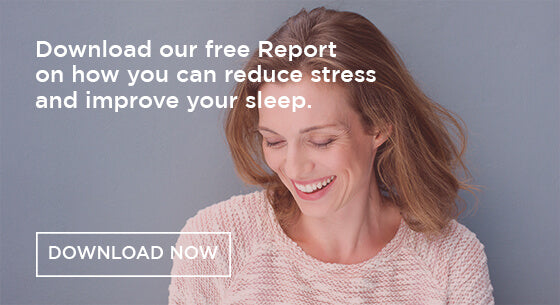Anxiety is something that many of us experience, though it can often vary from person to person. It can range from feeling as though your heart is racing, to feeling nauseous, shaky, or short of breath.
Anxiety is a feeling of unease and worry that can sometimes feel as though it is taking over your life, stopping you from doing the things you want to do, making daily tasks more difficult, or reducing your quality of sleep. But it doesn’t have to. We can treat it. We can return to our calm, happy self.
Whether you feel anxious for a moment or for a long period of time, it is important to understand the root cause of it so that you can treat it effectively. The treatment for any anxiety you experience should depend on what is really causing it.
In this article I share with you the 16 possible causes of anxiety, some of them well-known and others not so obvious. If your triggers are not so clear, it may be worth investigating.
What can be causing your anxiety?
1. Genetic predisposition
If you have a family member who has an anxiety disorder, then you could inherit a predisposition to being an anxious person from a young age. Genes can lead to anxiety as they can modify your emotional responses in addition to affecting your overall mood and mental health.
2. Neurological imbalances
Chemicals in the brain such as serotonin and dopamine all play a role in regulating your mood and how you feel. If these chemicals are imbalanced, they may manifest as feelings of anxiety in your mind and body.
3. Digestive microbiome imbalance
Your digestive tract is full of bacteria that communicates with the brain. Yet when this communication is thrown off, because your microbiome has become imbalanced, it can contribute to anxiety and impact your overall mood. This can be caused by eating high amounts of processed foods and sugar.
4. HPA axis dysfunction
When you experience chronic stress it can negatively impact your mental wellbeing. It can break down the very system in your body that creates a healthy response to stress (which is our HPA axis). In this way, your body becomes less resilient to stress the more you experience it. Some easy ways you can maintain a healthy HPA axis is through avoiding sugar and processed food, reducing caffeine, and taking magnesium (which chronic stress depletes).
5. Psycho-emotional stressors
Stressful events, unresolved traumas, and PTSD (post-traumatic stress disorder) can all cause feelings of anxiety.
6. Alcohol and drugs
Although alcohol depresses your nervous system, it can cause or worsen anxiety. It affects the balance of neurotransmitters in the brain such as serotonin, and as the alcohol wears off it can bring on physical symptoms of anxiety. It can lead to you feeling anxious for several hours or for the whole day after drinking. Certain drugs which act as stimulants, as well as psychoactive substances, can significantly drive anxiety.
7. Certain medications
Thyroid medication, ADHD treatment, steroids, anticonvulsants, medicines for Parkinson's and asthma are some examples of pharmaceutical drugs which can potentially cause anxiety. Although not technically considered a medication, caffeine contained in anything we consume can also drive anxiety.
8. Hormone imbalances
When your hormones become imbalanced, for example your levels are either too high or too low, it can interfere with your body’s processes and create anxiety. For example, when estrogen is too high in comparison to progesterone, anxiety can often develop. An excess in thyroid hormones can manifest as feelings of physical and mental anxiety.
Any season of life where there is a significant shift in hormonal changes can bring about anxiety. Some examples include the premenstrual phase, pregnancy, lactation, postpartum, and transitioning into menopause.
To keep your hormones balanced it is good to reduce stress and regularly engage in exercise. Our bestselling supplement Happy Hormones is also an easy way to naturally balance hormones, feel calm, and relieve related anxiety.
9. Infections
This may come as surprising but chronic infections can be a driver of anxiety. Stealth infections such as Lyme disease and co-infections like Epstein-Barr virus can wreak havoc on your immune, lymphatic, and nervous systems. Infections can, therefore, be one cause of anxiety.
10. Adrenal tumours
This is very rare but worth the mention. Pheochromocytomas are tumours of the adrenal gland which produces excess adrenaline. This, in turn, drives physical feelings of anxiety.
11. Cardiovascular disease
When you experience anxiety your sympathetic nervous system can quicken your heart rate and boost your body’s alertness. Cardiovascular conditions, which present with an abnormal heart rhythm or a heart rate that’s too fast, can cause anxiety and even be mistaken for anxiety/panic disorder.
12. Blood sugar imbalances
When blood sugar levels are lower than normal, this is called hypoglycemia. Hypoglycemia can cause feelings of anxiety, weakness, trembling, dizziness and lightheadedness.
13. Low blood pressure
Similar to hypoglycemia, hypotension or low blood pressure can also cause feelings of dizziness, trembling, weakness, and lightheadedness. When blood pressure drops, your heart can speed up in an attempt to help increase blood pressure. This can further worsen feelings of anxiety.
14. Vestibular conditions
Though it is not a well-known cause of anxiety, issues with the inner ear affect your body’s ability to sense movement, action, and location. Your inner ear governs your balance, and infections or vestibular migraines can make you feel dizzy, off-balance, and anxious.
15. Insomnia or lack of sleep
This is one of the leading contributors of anxiety, but an anxiety disorder can also cause a lack of sleep. Lack of sleep can cause you to become more stressed, further driving up adrenaline which, in turn, will make it harder for you to sleep. It is a vicious cycle that needs to be broken so our article on how to improve sleep might just help!
16. Nutrient deficiencies
When you are deficient in iron it can cause you to feel breathless, dizzy, fatigued and lightheaded. It can also speed up your heart rate. A lack of B vitamins - specifically B12 - can cause anemia which can bring on physical symptoms similar to those associated with a lack of iron. Other B vitamins, such as B6 and B9, have a significant role in the production of brain chemicals and a lack of these can interfere with mood.
Low magnesium can also drive anxiety. It plays an important role in the regulation of the HPA axis, which is in charge of your adrenals and the body's stress response. Other nutrient deficiencies which can cause anxiety include low zinc, Vitamin D, Omega 3 and even amino acids.
Treating Anxiety
Discovering the root cause of your anxiety can help you to learn the best and most effective way to start treating it. If you experience severe anxiety we suggest talking to either your local health practitioner or making an online appointment with one of our women’s health experts in our online clinic. We’ve worked with thousands of women who’ve successfully battled and conquered anxiety in their various life stages. And it can happen for you, too. When we learn more, seek support, and take action we can start to feel calm, balanced, and empowered again. Happy Healthy You is with you on the journey to feeling your best, healthiest self.
If you are suffering from nervousness or mild anxiety then you can consider some of the following remedies in conjunction with the information mentioned above.
- Passionflower is traditionally used in Western herbal medicine to relieve sleeplessness, reduce irritability and nervous tension and calm nerves.
- Rhodiola is traditionally used in Western herbal medicine to help the body adapt to stress, relieve feelings of general debility and support mental function.
- Withania is traditionally used in Ayurvedic medicine as a rejuvenating tonic, helps the body adapt to stress and relieves symptoms of mild anxiety.
- Vitamin B6 maintains nervous system health and function.
All of the above ingredients can be found in Happy Calm, our natural supplement that works to reduce stress, relieve anxiety, and improve sleep. If you often feel tense, imbalanced, anxious and sleepless, Happy Calm can help you feel rejuvenated, well-rested, and relieved from anxiety.
You can find out more about Happy Calm and how it works here.
REFERENCES
Lin Wan, Yuhong Li, Zhengrong Zhang, Zuoli Sun, Yi He, Rena Li. Methylenetetrahydrofolate reductase and psychiatric diseases. Translational Psychiatry. 2018 Nov 5;8(1):242.
https://pubmed.ncbi.nlm.nih.gov/30397195/
Marc-Antoine Crocq. The history of generalized anxiety disorder as a diagnostic category. Dialogues in Clinical Neuroscience. 2017 Jun;19(2):107-116.
https://pubmed.ncbi.nlm.nih.gov/28867935/
Shigeo Miyata, Ryota Kumagaya, Toshikazu Kakizaki, Kazuyuki Fujihara, Kaori Wakamatsu, Yuchio Yanagawa. Loss of Glutamate Decarboxylase 67 in Somatostatin-Expressing Neurons Leads to Anxiety-Like Behavior and Alteration in the Akt/GSK3β Signaling Pathway. Frontiers in Behavioral Neuroscience. 2019 Jun 18;13:131.
https://pubmed.ncbi.nlm.nih.gov/31275123/
K Młyniec, M Gaweł, U Doboszewska, G Starowicz, G Nowak. The Role of Elements in Anxiety. Vitamins and Hormones. 2017;103:295-326.
https://pubmed.ncbi.nlm.nih.gov/28061974/
Kendall D Jeynes, E Leigh Gibson. The importance of nutrition in aiding recovery from substance use disorders: A review. Drug & Alcohol Dependence. 2017 Oct 1;179:229-239.
https://pubmed.ncbi.nlm.nih.gov/28806640/
Thomas Brandt, Marianne Dieterich. 'Excess anxiety' and 'less anxiety': both depend on vestibular function. Current Opinion in Neurology. 2020 Feb;33(1):136-141.
https://pubmed.ncbi.nlm.nih.gov/31743237/
Monique Aucoin, Sukriti Bhardwaj. Generalized Anxiety Disorder and Hypoglycemia Symptoms Improved with Diet Modification. Case Reports in Psychiatry. 2016;2016:7165425.
https://pubmed.ncbi.nlm.nih.gov/27493821/











Leave a comment
This site is protected by hCaptcha and the hCaptcha Privacy Policy and Terms of Service apply.